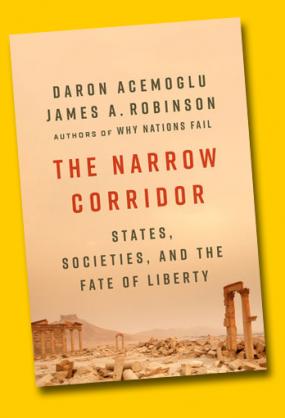Nearly three decades after the fall of the Berlin Wall, University of Chicago scholar James A. Robinson has co-authored a new book exploring why liberty thrives in certain states but falls to authoritarianism or anarchy in others.
In The Narrow Corridor: States, Societies and the Fate of Liberty, Robinson and co-author Daron Acemoglu of the Massachusetts Institute of Technology argue for the existence of a narrow corridor to liberty—one which stays open only through a fundamental and incessant struggle between state and society. That struggle was put on dramatic display with the fall of the Berlin Wall in November 1989.
The wall’s destruction symbolized the prevailing power of the demand for liberty around the world, and launched such schools of thought as Francis Fukuyama’s 1989 prediction of the “end of history,” which he described as “the universalization of Western liberal democracy as the final form of human government.” In The Narrow Corridor, Robinson and Acemoglu investigate the factors that sustain liberal democracies, as well as the ones that lead to autocracy.
“Thirty years ago, many people believed that we were all going to converge to some notion of liberal democracy,” said Robinson, a renowned political scientist and economist at the Harris School of Public Policy. “Liberal democracy triumphed more or less intellectually, ethically and in practice. And, that's obviously not the case now. In fact, it’s almost the opposite—rather than converging to us, we might be converging to them.”
The book is the third that Robinson, the Reverend Dr. Richard L. Pearson Professor of Global Conflict Studies at Harris Public Policy, has published in collaboration with Acemoglu. It is the follow-up to their 2012 international bestseller, Why Nations Fail.
Acemoglu and Robinson begin The Narrow Corridor by questioning whether the “end”—as Fukuyama envisioned it—is actually near, and if not, what must be done in order to reach true liberty, defined in the Lockean tradition as people being “free from violence, intimidation, and other demeaning acts, free to make choices about their lives, and have the means to carry them out without the menace of unreasonable punishment or draconian social sanctions.”
Convergence to liberal democracy wasn't the case in China or Russia, Robinson argues. Nor has it been the case in large parts of the rest of the world, including Latin America and Africa—two regions where Robinson has focused his research efforts in the field of political and economic development, and the factors that are the root causes of conflict.
“Why was that prediction so completely wrong?” Robinson said. “In some ways you can think about the book as providing a theoretical framework for thinking about that and thinking about the circumstances under which liberal democracy has emerged historically, or could emerge in a different society.”
He and Acemoglu, an Institute Professor of Economics at the Massachusetts Institute of Technology, seek to not only define the narrow corridor, but suggest a path through it to a true liberal society. The authors’ examples range from the Epic of Gilgamesh to the collapse of the Syrian state, from late-medieval Italy to Pinochet’s dictatorship over Chile in the 1970s, and many others.
“One of the things we like about this framework is that this notion of a corridor emphasizes that this is a process. This doesn’t happen overnight,” Robinson said. “And you need to get this balance right. In some sense, what happened in Russia in the 1990s is people thought you could just set up this elaborate constitutional architecture, and everything would be fine. But it wasn’t fine because the state was much too strong, the security apparatus was too strong and society was too weak.”
Competition between state and society is at the core of what the co-authors explore in The Narrow Corridor, a version of liberty that requires the state and its laws, but which encourages the people to exercise societal control.
“Society needs to control the state so that it protects and promotes people’s liberty rather than quashes it like Assad did in Syria before 2011,” they write in the book. “Liberty needs a mobilized society that participates in politics, protests when it’s necessary, and votes the government out of power when it can.”
It’s an exceptionally timely and pertinent framework of thought, particularly in the lead-up to an incredibly fraught election year in the United States. But to read The Narrow Corridor as modern political commentary would be to miss Robinson and Acemoglu’s larger point.
“This is not supposed to be a book about current events today,” Robinson said. “It’s not our agenda. It’s not what Daron Acemoglu and I have worked 25 years on, to write a book about current events that people read today and forget in six months’ time. We're not terribly interested in commenting on the Trump administration. There's a social science agenda here.”
In Why Nations Fail, Robinson and Acemoglu emphasized the idea that inclusive economic institutions are key to effective economic development worldwide, as they are connected to inclusive political institutions.
In comparison, Robinson said, The Narrow Corridor “is really a much richer framework for thinking about this divergence in the world in political institutions. You could think of it as the long-run underpinnings of inclusive and extractive political institutions.”
—Adapted from a release that appeared on the Harris Public Policy website.
